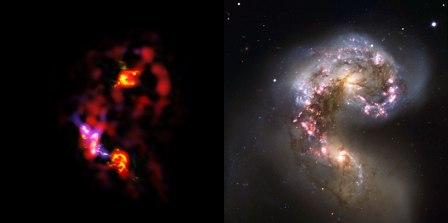Kapteyn Institute bouwt mee aan sterrenwacht Chili
Maandag 3 oktober zijn de eerste sterrenkundige opnames gemaakt met ALMA, de Atacama Large Millimeter Array in Chili. Dit is een telescoop die zal bestaan uit 66 antennes en die grootste telescoop op aarde zal vormen. Op dit moment zijn 20 antennes geplaatst. In elke antenne zit een instrument ontwikkeld door het Kapteyn Astronomical Institute van de Rijksuniversiteit Groningen.
Eerste opnames van telescoop
Met dit instrument kan de niet-zichtbare straling worden opgevangen die sterrenstelsels uitzenden, het zogeheten millimeterdeel van het elektromagnetisch spectrum. ALMA ontvangt millimeter- en submillimetergolven uit het heelal – straling met golflengten die ruwweg duizend keer zo lang zijn als die van zichtbaar licht. Deze lange golflengten stellen astronomen in staat om extreem koude objecten in de ruimte te onderzoeken, zoals de dichte wolken van kosmisch stof en gas waaruit sterren en planeten ontstaan. Ook kunnen met ALMA zeer verre objecten in het jonge heelal worden waargenomen.
Antennae Galaxies, side-by-side comparison of ALMA and VLT observations

Botsende sterrenstelsels
Een van de eerste opnames die ALMA maakte van de Antenne Sterrenstelsels NGC 4038 en 4039, twee botsende sterrenstelsels. Uit die botsing ontstaan vele nieuwe sterren. Dit soort stervormingsgebieden zijn zeer interessant voor astronomen.
Op tv
Naar aanleiding van de ALMA first science heeft TV Noord een rapportage gemaakt over de instrumentele en wetenschappelijke bijdrage die het Kapteyn Astronomical Institute van de Rijksuniversiteit Groningen levert aan ALMA. Zie deze video-rapportages:
RTV Noord
Meer informatie over ALMA: ESO -website (European Southern Observatory)
Meer nieuws
-
29 januari 2026
Microplasticonderzoek - opgeblazen nieuws of een echt gevaar?
-
27 januari 2026
ERC Proof of Concept grant voor Maria Loi
